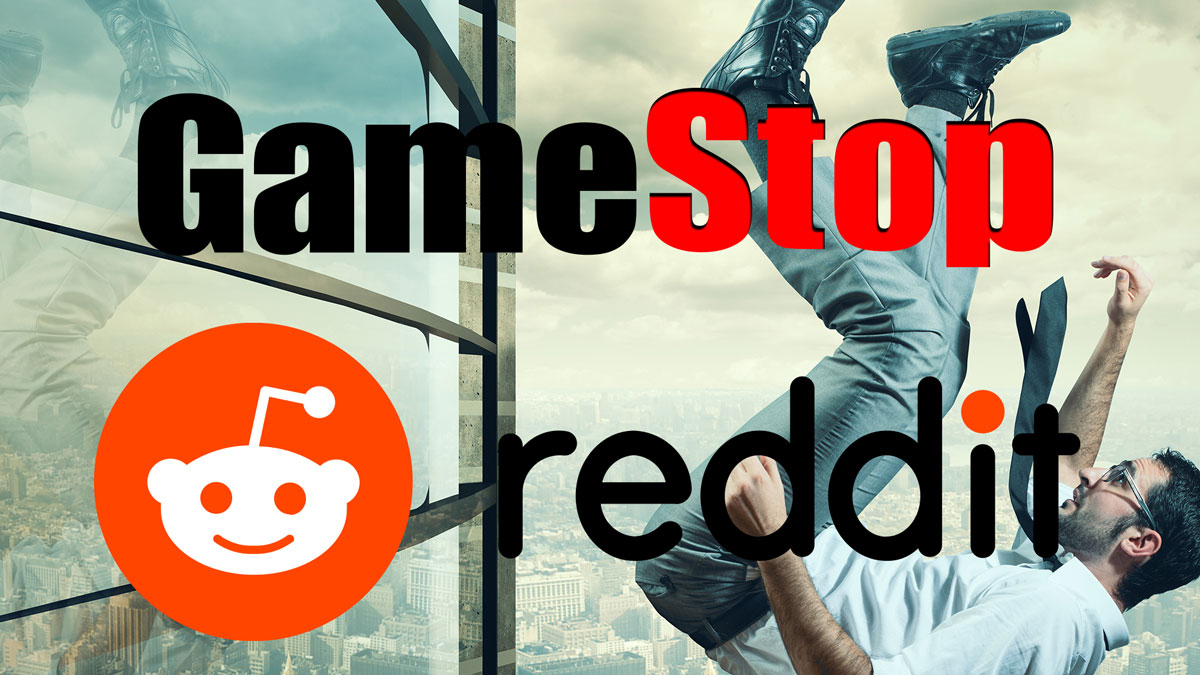Business
“GameStonks vs. Wall Street”: Heroes, Victims and Hogwash
Published
3 years agoon

Above: Photo Collage / Lynxotic / Adobe Stock
The story that won’t stop and the very fine people on all sides
No heroes, plenty of villains and lots and lots of nonsense and stupidity. But before getting into the nuts and bolts of this tragic “new” phenomena, take a second and think about all those media stories, in nearly every online media outlet, even hitting local news.
Each “take” on the story has a different slant and spin and almost none go into the boring and complex technical details of stock trading schemes. Most, it appears, are cheering on, implicitly, the “main street” buyers in an imaginary “war” on Wall Street.
[Disclaimer: Nothing in this article should be construed as legal or financial advice.]
That will get you more clicks.
A few will point out that GameStop, the company that is, which has no real prospect to rise from its comatose state into a Tesla-like world beater, regardless of how high the stock climbs for a few weeks or so.
And they will, rightly, warn that in this game, the “innocent” main street “investor” will lose in the end. Those are the boring stories. Not as many clicks for them.
The longer more accurate story of what is going on touches on the Great Depression, the Dot-com bubble, the financial crisis of 2008 and an understanding of stock trading that goes beyond the patience threshold of the general public and the media, even beyond most so-called Wall Street Insiders.
History does exist, even if it happened before your uncle was born
Up until 1934 many things were legal and rampant that today, technically, are not allowed. Insider Trading is the most obvious and best defined, look up Martha Stewart and jail time if you want to know more about that.
Collusion in the market is another less well known practice, also known as “pump & dump” that has as many variations as Ponzi schemes and, though illegal, will never be stamped out. The technical terms for Colluding in relation to stock trading are “securities fraud” or “market manipulation.”
Not to get technical but here’s an partial excerpt of the legal specifics:
15 U.S. Code § 78i – Manipulation of security prices
(a) – (2 To effect, alone or with 1 or more other persons, a series of transactions in any security registered on a national securities exchange, any security not so registered, or in connection with any security-based swap or security-based swap agreement with respect to such security creating actual or apparent active trading in such security, or raising or depressing the price of such security, for the purpose of inducing the purchase or sale of such security by others.
Enter Reddit’s r/wallstreetbets forum. Not saying that there is anything illegal about “loving” a company as a group and choosing to “support” it by buying its shares.
Even if the motivation (false and imagined) is to “hurt” the short sellers in some kind of Robin Hood attack, that’s probably not something the SEC would care about. Short selling professionals can take care of themselves.
Enter another part of history: the allegedly overvalued company effect
Attacking short sellers has become a kind of sport, particularly when it’s about an emotional connection that was partly responsible for a company’s shares being “overvalued” by traditional metrics in the first place. Once “overvalued” therefore, a target to be sold short by traders and hedge funds that believe in quaint things like profit to earnings ratios and the like.
While company’s share prices being “overvalued” is based on opinion and often wrong, there have been recent cases, since the NASDAQ bubble burst in 2000, that have added a somewhat new, larger, twist on the typical understanding of these types of situations.
Bubble is as bubble does
To take the biggest example, there is Amazon (AMZN) which would take a thousand page book to accurately and fully elaborate on, but for the sake of brevity a couple of points could be made.
It is well known that Amazon posted substantial losses for many years while the stock price generally continued to rise. This was attributed to shareholders’ willingness to forgo proof of financial success within the company and persisted in buying & holding in the hope that share prices would continue to rise and that the company eventually would show profits and more success.
All of that seemed to happen, in the case of Amazon, when viewed casually, and now there is a sense, among some, that overvaluation, in “outlier” cases, is no longer a valid reason to sell (or short) a stock. Everybody’s happy right?
The uses of inflated value is a sticky-wicket if you are the loser
Not everybody. Naturally there are many “bad” short sellers who likely lost by shorting Amazon during it’s unrelenting rise since 2000. They are unlikely happy.
But also, and here’s the rub, there were whole industries crushed by the power that came with that “over-valued” stock price that seems, from looking at reams of data, to have been used to finance the selling of goods at substantial losses for “as long as it takes” to damage competitors.
Ultimately, for Amazon, creating a possibly dangerous monopoly (or monopsony, as it were) position with the potential for further damage to not just competition, and the overall marketplace, but to society as a whole.
This is, of course, opinion but ask, if you will, the various agencies in charge of anti-trust actions for further concurring opinions.
Tesla is a whole other story, but a completely unique one
However, the situation is clearly not black and white. An alternate opinion could be held regarding the similar, yet very different, situation at Tesla (TSLA). Short interest throughout the rise? Absolutely. Overvaluation by traditional metrics, yup.
But in this case there is both a technological argument to be made, as well as a geopolitical / moral one, that the company’s wider mission: “Tesla’s mission is to accelerate the world’s transition to sustainable energy” is a more than valid justification for wanting to support the company, in any way possible, including through the purchase of it’s purportedly overvalued shares.
That kind of goodwill is the x-factor that is now being twisted into a justification for pumping GameStop (GME) into the stratosphere, beyond the kind of overvaluations that either Amazon or Tesla ever enjoyed (and that’s saying a lot!) while downplaying the “dump” part of the “pump & dump” scenario.
Of course here’s the tragic part; the dump phase always comes, and in reality, is the whole point. Next… ooopsy, while writing this the dump started with GME in the form of a drop from around $500 per share to $226.
For a sub-$20 stock, of course, that’s still extremely high and there will no doubt be gyrations in both directions before the final drop back to obscurity.
Twas ever thus, but still not nice
But the tragedy is in the idea, bandied about in the media and amplified in social media infinitely, that there are “Robin Hood” actors in this game (not the company but the dude in the forest in the movie).
In the end there may be a few that knew all along that “dump” was an integral and necessary part of pump & dump and I am sure there will be plenty of celebration of their “genius” exploits.
But the focus from any of us in the media should be at the tragedy of those that got lost in the hype and stupidity and chose to offer themselves up to the gods of GameStop, the market and Reddit’s r/wallstreetbets as cannon fodder:
”I was in my early teens during the ’08 crisis. I vividly remember the enormous repercussions that the reckless actions by those on Wall Street had in my personal life, and the lives of those close to me. I was fortunate – my parents were prudent and a little paranoid, and they had some food storage saved up. When that crisis hit our family, we were able to keep our little house, but we lived off of pancake mix, and powdered milk, and beans and rice for a year. Ever since then, my parents have kept a food storage, and they keep it updated and fresh.”
”I bought shares a few days ago. I dumped my savings into GME, paid my rent for this month with my credit card, and dumped my rent money into more GME (which for the people here at WSB, I would not recommend). And I’m holding. This is personal for me, and millions of others.”
”You can drop the price of GME after hours $120, I’m not going anywhere. You can pay for thousands of reddit bots, I’m holding. You can get every mainstream media outlet to demonize us, I don’t care. I’m making this as painful as I can for you”.
ssauron on Reddit
Emphasis mine
Subscribe to our newsletter for all the latest updates directly to your inBox.
Find books on Music, Movies & Entertainment and many other topics at our sister site: Cherrybooks on Bookshop.org
Enjoy Lynxotic at Apple News on your iPhone, iPad or Mac
Lynxotic may receive a small commission based on any purchases made by following links from this page



